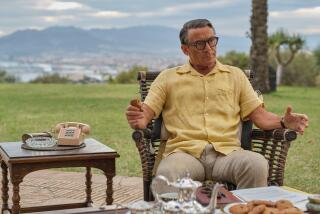Dyan Cannon writes about Cary Grant
- Share via
Actress-director Dyan Cannon recalls in her memoir, “Dear Cary: My Life With Cary Grant,” that she and Grant were over the moon with joy at the birth of their daughter, Jennifer, in February 1966. But when she brought the baby home, Cannon realized that her beloved Yorkie, Bangs, was nowhere to be found.
Grant matter-of-factly told her that he had given Bangs away. “Infants and dogs aren’t a good mix, Dyan,” she quotes him as saying. “Animals can experience extreme jealousy around newborns.”
“It killed me,” Cannon recalled in an interview. Adding salt to the wound, she learned that Bangs died soon thereafter. “I didn’t put it in the book,” she said softly. “I knew she couldn’t live without me. She thought I had abandoned her.”
Grant’s decision to get rid of the dog without talking to his wife about it was a sign of the downward spiral their marriage was taking.
Cannon is curled up on some oversized pillows on the hardwood floor of the living room of her West Hollywood condo. Dancing around her are her two four-pound Chihuahuas, Matilda and J.C. At 74, Cannon is single, slender and vivacious, with long, untamable hair and a loud, infectious laugh.
Her candid memoir — “I took my clothes off in this book” — chronicles the near fairy tale May-December romance between the ingenue and the legendary star of 1938’s “Bringing Up Baby,” 1959’s “North by Northwest” and 1963’s “Charade, “and how it all turned south once they got married in 1965 (she was 28; he was 61) and she gave birth to Jennifer.
“I am not dishing Cary in [my book],” said Cannon, who earned supporting actress Oscar nominations for 1969’s “Bob & Carol & Ted & Alice” and 1978’s “Heaven Can Wait.” “I want people to love Cary more at the end of this because they can understand what formed him and what he overcame to be who he was.”
Cannon forgave Grant for their marital problems a long time ago. “I think I love him more now,” she said. They divorced in 1968; he died at the age of 82 in 1986.
She was an up-and-coming actress in the early 1960s when she got a call that Grant, who had been married three times before, wanted to see her. Cannon thought it was for a part, but the real reason was that he had become smitten with her when he saw her in a guest shot on a 1960-61 TV series called “Malibu Run.”
Soon after they met, they became Hollywood’s latest golden couple. In between acting gigs, Cannon would accompany him on the sets of such films as “Charade,” which was shot in Paris. All of sudden, she was traveling in some of the most starry of circles, meeting and hobnobbing with the likes of Noel Coward, James Stewart, Frank Sinatra and Audrey Hepburn.
“If you think he exuded charm on the screen, being with him it was ‘times it by a billion,’” she said. “Our romance was beautiful. We talked so easily. We connected on so many levels. I loved to hear him sit at the piano and sing Cole Porter songs to me. I loved to play word games with him. It didn’t matter to me honestly what we did. I was happy. But he didn’t know how to be happy.”
Though Grant was the epitome of sophistication and elegance, she said, he was haunted by his impoverished childhood in Bristol, England, where he was born in 1904 as Archie Leach.
“His dad was a philanderer,” Cannon said. “At 10, Cary comes home from school one day and he says, ‘Where’s Mom?’ His father said, ‘She went to the seashore for a visit.’ Cary thought, ‘Oh my God, I must have done something wrong.’ Three months later, his father says she’s dead. Cary wanted to live with his dad, who by now is living with a younger girl and has a baby with her. The father says, ‘There really is no room here for you.’ He is abandoned by his father and thinks his mother is dead.”
Years later, Grant got a call from his father and they set up a meeting at a pub. “His father said to him, ‘Your mother is in an insane asylum.’ When he heard the news, Cary was guilt ridden.”
That’s one of the reasons why Grant began to take LSD in the late 1950s. “He thought it was a gateway to God,” she said. “He thought it was going to help him find peace.”
Grant persuaded Cannon to try LSD before they married; the trip was a hellacious experience for her. And when their marriage began to have problems, she took LSD with him several times. “I knew I shouldn’t do it, but I did it to please him and to save our marriage,” she said. “But I kept saying, ‘How is this going to help me find God? How is this going to help you find God?’ He didn’t force me to take it. I said, ‘Yes.’”
After their divorce, Cannon tried to ease her pain with pot and pills. She had a breakdown and ended up, as she described it, “in the nut house. I was locked up. Most of my best friends didn’t know about it.” With the help of doctors and therapists, she was able to let go of the hurt.
Though Cannon doesn’t act as often as she once did, she has been busy for the last few years directing a documentary about children living on the streets in Los Angeles, which she is currently editing. She also has meetings called “Get Your Luv On” at the CBS lot in Studio City every other Saturday night to help young talent, as well as helping people “heal their hearts.”
Earlier this year, Jennifer Grant published her own memoir, “Good Stuff: A Reminiscence of My Father, Cary Grant,” which offers a loving portrait of Grant. “A relationship between a father and daughter is much different than between a mother and a father,” Cannon said.
More to Read
The biggest entertainment stories
Get our big stories about Hollywood, film, television, music, arts, culture and more right in your inbox as soon as they publish.
You may occasionally receive promotional content from the Los Angeles Times.











